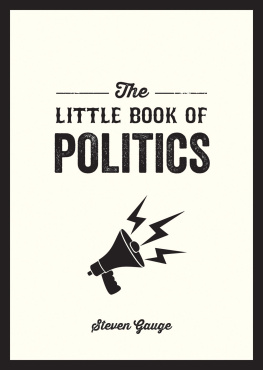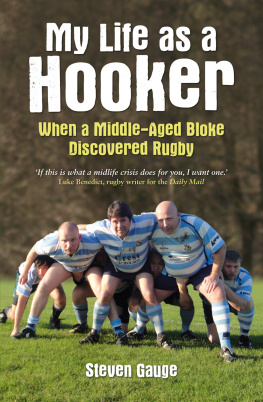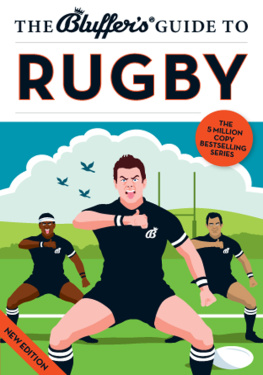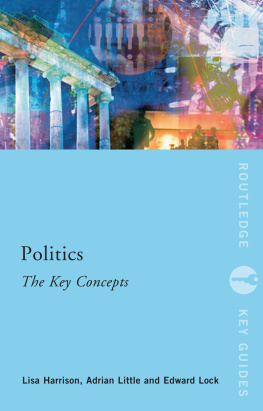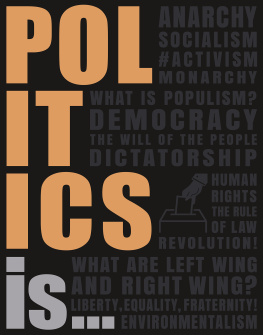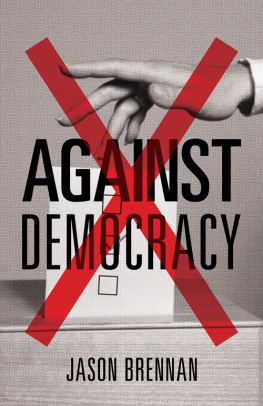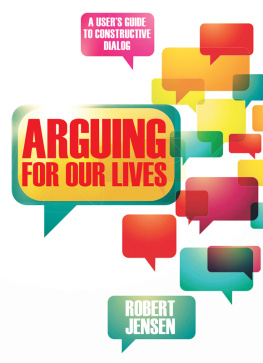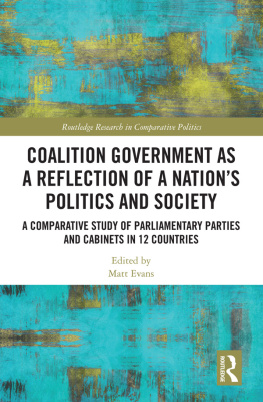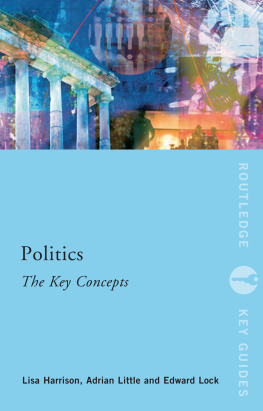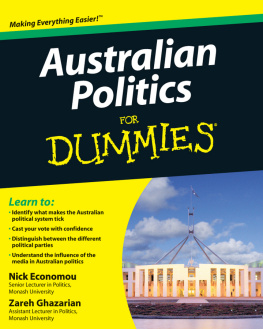THE LITTLE BOOK OF POLITICS
Copyright Summersdale Publishers Ltd, 2018
All rights reserved.
No part of this book may be reproduced by any means, nor transmitted, nor translated into a machine language, without the written permission of the publishers.
Steven Gauge has asserted his moral right to be identified as the author of this work in accordance with sections 77 and 78 of the Copyright, Designs and Patents Act 1988.
Condition of Sale
This book is sold subject to the condition that it shall not, by way of trade or otherwise, be lent, resold, hired out or otherwise circulated in any form of binding or cover other than that in which it is published and without a similar condition including this condition being imposed on the subsequent purchaser.
An Hachette UK Company
www.hachette.co.uk
Summersdale Publishers Ltd
Part of Octopus Publishing Group Limited
Carmelite House
50 Victoria Embankment
LONDON
EC4Y 0DZ
UK
www.summersdale.com
ISBN: 978-1-78685-825-2
Substantial discounts on bulk quantities of Summersdale books are available to corporations, professional associations and other organisations. For details contact general enquiries: telephone: +44 (0) 1243 771107 or email: .
Contents
SAFE IS SPELT D-U-L-L. POLITICS HAS GOT TO BE A FUN ACTIVITY.
ALAN CLARK
Introduction
More and more people are getting interested in politics, and politics is getting more and more interesting. As politicians find new ways of winning and using power, people everywhere are finding new ways of getting politically active. Opinions and attitudes are shifting at such a pace that the pollsters and pundits are struggling to keep up.
Politics finds its way into almost every corner of our lives. Whilst the plotting, scheming and petty point-scoring might put some off, others thrive on it. Passions rise when the issues affect people's lives. Finding out how to play your part in the political process has never mattered more.
Politics is too important to leave to the politicians, so this little book would like to warmly welcome you into the political world. It will be your handy guide as you take your first tentative steps towards becoming politically active. With a bit of the history, the things you need to know today and a few tricks of the trade, it will help you to change the world for the better and stand up for what you believe.
POLITICS IS SUPPOSED TO BE THE SECOND-OLDEST PROFESSION. I HAVE COME TO REALISE THAT IT BEARS A VERY CLOSE RESEMBLANCE TO THE FIRST.
RONALD REAGAN
SO, WHAT IS POLITICS?
Politics is a convenient way of describing the delicate art of sorting things out when there is a wide variety of different interests at play. It's sometimes about power on an international scale, and at other times about local activists getting broken streetlamps fixed in their neighbourhood. Politics is driven by elections, but it doesn't stop there. When the votes are counted and the declarations made, there are alliances to be formed and deals to be done.
For some, politics is a dirty word, an insult or a catchall term for the worst aspects of public life. For others, it is something to be promoted and celebrated. At the end of the day, politics is the perfectly imperfect place where public policy, power and personal ambition meet to fix things, and (whisper it quietly) many would argue that the world is a better place as a result.
THE GREEKS HAD A WORD FOR IT
The philosopher Aristotle was one of the first to have a go at talking about politics. Back in Ancient Greece, he came to the view that 'Man is by nature a political animal'. This, he decided, was mostly because, unlike other animals, we have the power of speech and can tell the difference between good and evil. Anyone who didn't want to take part in politics was, in Aristotle's view, either an outcast, a lover of war or like a bird flying alone. An Ancient Greek city or city-state was known as a polis, and so politics was literally the affairs of cities.
THE SCIENCE OF POLITICS
The American academic Harold Lasswell wrote a book about politics in 1936, and its very title became the go-to definition for political scientists. It was called Politics: Who Gets What, When, How. In other words, he argued that politics was about power and the distribution of resources.
Universities all around the world take great pleasure in seeking to explain how politics really works, whilst mostly making it utterly incomprehensible. Scholars grapple with the intricacies of political theory, and think about how politicians interact with civil servants and campaigning groups and why people vote the way they do. Acres of forest have been pulped to produce the political books and journals that help to fill academic libraries, but in the real world politics moves on quite quickly. Often, the elegant theories of the scholars are wildly out of date before the ink has dried.
In short, you don't need a politics degree to enjoy politics or engage in political debate!
HISTORY IS PAST POLITICS. POLITICS IS PRESENT HISTORY.
E. A. FREEMAN
UK POLITICS BY NUMBERS
Before we probe too deeply into some more intimate details of how British politics works, let's have a look at the numbers. As you will see, they all add up to explain how politics finds its way into so many aspects of our lives.
| Monarch (is supposed to be 'above politics', so tops this list) |
| Government ministers |
| Members of Parliament (533 from English constituencies, 59 from Scotland, 40 from Wales and 18 from Northern Ireland) |
| c.800 | Members of the House of Lords (Peers) |
| Members of the Scottish Parliament |
| Members of the Northern Ireland Assembly |
| Members of the National Assembly for Wales |
| Local authorities |
| c.21,000 | Local authority councillors |
| c.11,000 | Parish, town, community and neighbourhood councils |
| c.80,000 | Parish, town, community and neighbourhood councillors (in England) |
| c.46 MILLION | Registered voters |
| c.66 MILLION | Population of the UK |
TIMING IS EVERYTHING
General elections used to happen whenever the prime minister decided to nip round to Buckingham Palace and ask the monarch to dissolve Parliament. Each election had to be within five years of the last one, but often they would happen sooner than that. If the prime minister thought things were looking good, they might call an election early. Alternatively, if things were going badly and they lost something called a 'vote of confidence' in the House of Commons, they would have to have an early election whether they wanted one or not.
The Fixed Term Parliaments Act (2011) changed all that. Elections now happen on the first Thursday in May every five years, but there can still be a snap election if twothirds of MPs vote for one. That's what happened in 2017.

